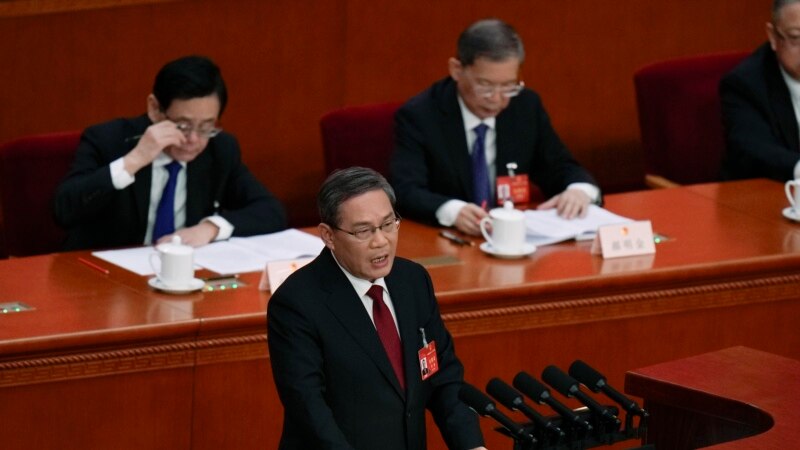
China’s top leader on Tuesday set an ambitious 5% economic growth target for 2024 and vowed to “make progress while maintaining stability” amid a sluggish economy and weak investor and consumer confidence.
In his first work report since taking office as China’s second-largest authority in October last year, Chinese Premier Li Qiang admitted that China faces an environment of coexisting opportunities, risks and challenges, but emphasized that the favorable conditions still outweigh the unfavorable factors. Xinhua News Agency.
Li Keqiang said that in the face of weak global economic growth and the lack of a solid foundation for China’s stable economic growth, China will continue to adopt “active fiscal policies and prudent monetary policies” to deal with a series of economic challenges.
Li Keqiang said that the Chinese government plans to issue approximately US$139 billion in special government bonds in the next few years, while providing support to heavily indebted local governments and adhering to a “high-quality development” strategy that focuses on promoting economic growth through economic growth. Innovation.
Li Keqiang said China will mobilize national resources to “promote the construction of a modern industrial system and accelerate the development of new productive forces” and let innovation drive economic growth, according to China’s official Xinhua News Agency.
Li Keqiang’s speech comes as China faces a series of economic challenges, including an ongoing housing crisis, low consumer and household confidence and weak external demand. While Li Keqiang has pledged to expand domestic demand and step up efforts to attract foreign investment, some economists say the plans may become little more than “policy slogans” unless China embarks on fundamental economic reforms.
“Many strategic industries in China are controlled by state-owned enterprises, and investment efficiency is quite low,” Wang Wangochen, a Chinese economic expert at Taiwan’s China Economic Research Institute, told VOA on the phone.
In his view, even if China tries to increase its support for private enterprises, state-owned enterprises or military-industrial enterprises to continue to control domestic strategic industries, it will be difficult for the Chinese government to escape from the current economic turmoil.
“If Beijing does not fundamentally change its economic model, it will be difficult for China to implement new economic strategies such as high-quality development and new productivity,” Wang told VOA.
While some economists are skeptical, other analysts say the Chinese government will continue to focus resources on technological innovation in the near future.
“The focus of the entire government work report is modernization with Chinese characteristics and new productivity,” Wang Xinxian, an expert on Chinese politics at Taiwan’s National Chengchi University, said in a telephone interview with VOA.
He said that a large part of Li Keqiang’s speech focused on technological innovation, which may also be Beijing’s response to U.S.-led restrictions on its access to some core technologies such as advanced semiconductor chips. “These policy recommendations have a lot to do with the international challenges China faces,” Wang said.
In addition to outlining Beijing’s economic measures for next year, Li Qiang also stressed China’s need to strengthen social security and services, including a comprehensive strategy to deal with the rapid aging of the population and measures to address youth unemployment.
As China’s National People’s Congress passed the revision of the State Secrets Law just days before the Two Sessions, Li Keqiang reiterated the Chinese government’s need to “maintain national security and social stability.” “[We should] While strengthening the construction of the national security system, we must adhere to the overall national security concept. ”
Some analysts said Li Keqiang’s speech showed that security remains the Chinese government’s top concern. According to statistics from Huang Ruihan, a senior researcher at the Chicago think tank Marco Polo, the word security was mentioned 28 times in this year’s government work report, three times the number last year.
When Li Keqiang emphasized the importance of prioritizing national security in his speech, some experts told VOA that this governance model has brought costs to the Chinese economy. “when [a government] Ian Chong, a political scientist at the National University of Singapore, told VOA by phone: “Investing one more unit in security means, at least in the short term, one less unit of investment in other areas, including economic growth. ”
Although some analysts called Li Keqiang’s speech and the contents of China’s government work report “unsurprising,” the Chinese government’s decision to cancel the prime minister’s press conference at the end of the annual legislative session is still a precedent-breaking move that reflects the power is waning. Under China’s current political system, the prime minister has power.
Yang Dali, a political scientist at the University of Chicago, told VOA by phone that the Chinese government has “redefined the role of the prime minister and positioned him as the executor of decisions made by the Politburo, the highest decision-making body under the leadership of the general secretary.”
As the world now interprets the signals reflected in Li Qiang’s speech on Tuesday, Singapore’s Zhang believes that the outside world’s view of China is likely to remain unchanged in the short term.
“Ultimately, what investors want is certainty, and to get more certainty, data must be more transparent and compliance must be easy to follow,” he told VOA. “Although Li Qiang talked about confidence, it really doesn’t come true. The tools of faith don’t exist.”
Follow us on Google news ,Twitter , and Join Whatsapp Group of thelocalreport.in
















